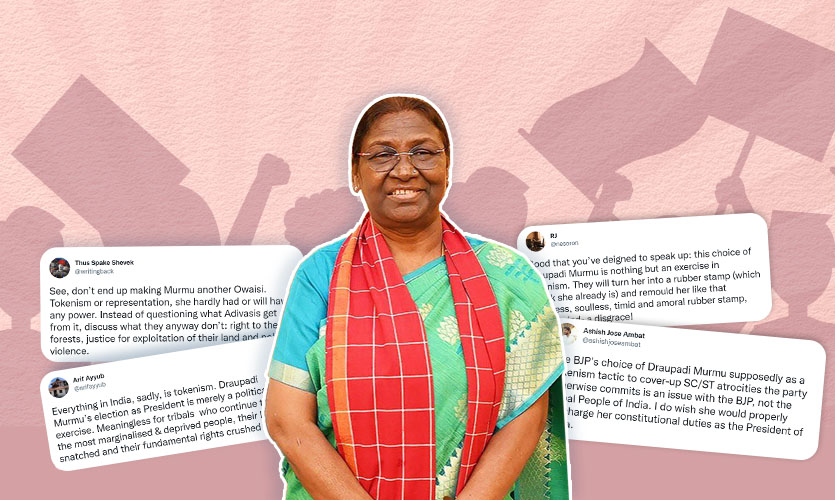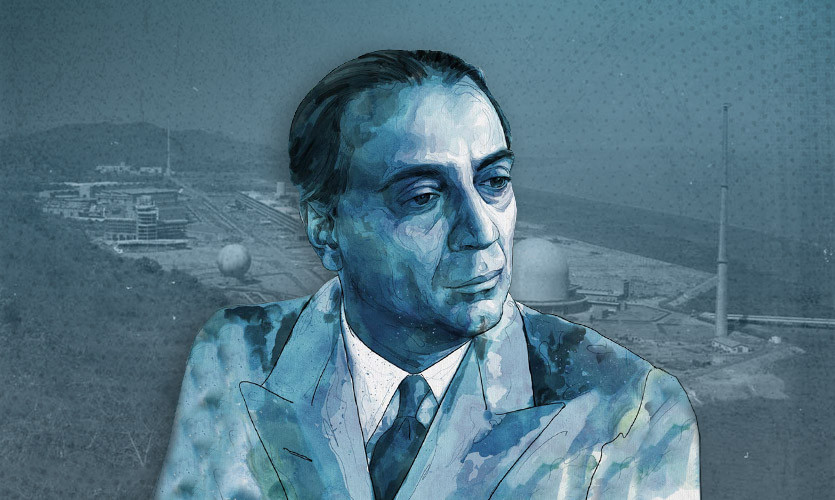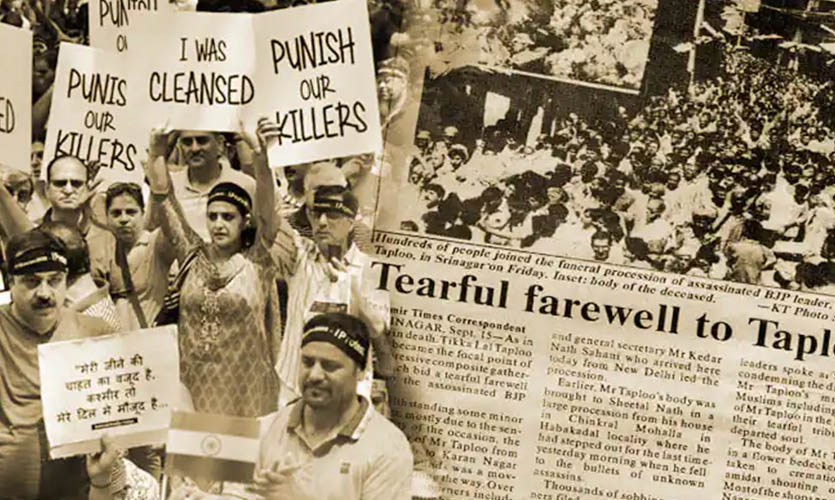On July 21, 2022, Droupadi Murmu became the first President of India hailing from the tribal community.
Backed by several leaders across party lines, Murmu created history, marking a new milestone in India’s path to progress.
Why, then, has this victory been marred with questions of tokenism?
Election
The election of Droupadi Murmu as India’s First Citizen and Supreme Commander of the Indian Armed Forces broke a number of records this week. Hailing from the Santhal scheduled tribe, Murmu became the first from a tribal community to hold the highest constitutional office of India, and the second woman. At 64, she is also the youngest to be elected to the position, and the first Indian president to be born after independence. She will take office on July 25.
Reportedly, Murmu polled 6,76,803 votes in her favour, in comparison to 3,80,177 votes garnered by opposition candidate Yashwant Sinha. While she received overwhelming support from the state assemblies of Maharashtra and Uttar Pradesh, Sinha received maximum support from Tamil Nadu and West Bengal. As per several reports and BJP sources, a number of Opposition MPs and MLAs cross-voted in favour of Murmu, defying their parties’ stated support for Sinha. The BJP has claimed that 17 MPs from the Lok Sabha and the Rajya Sabha, and 126 MLAs from state assemblies have defied party lines to vote for Murmu. According to several reports, it is likely that 22 Opposition MLAs in Assam, 20 in Madhya Pradesh, 16 in Maharashtra, 10 each in Gujarat and Jharkhand, seven in Meghalaya, six each from Bihar and Chhattisgarh, four from Goa, three in Himachal Pradesh, and one in Haryana cross-voted. The BJP has expressed joy over attaining one vote from the Kerala Assembly (which has no BJP legislators), stating that it holds “more value than the rest of 139 votes polled” in the state.
“Opposition unity” became a term for mythological books in this election, with leaders across party lines backing Murmu. “Droupadi Murmu polled 104 votes compared to NDA’s original strength of 79 in the 126 member Assam Assembly. 2 absent. My heartfelt gratitude to the people of Assam for reposing their faith in the NDA’s Presidential candidate & wholeheartedly joining this historic moment,” said Assam CM Himanta Biswa Sarma. “In Madhya Pradesh, many non-BJP MLAs have also voted for Murmu ji with their conscience, and I would thank them all,” said MP CM Shivraj Singh Chouhan.
“Congratulate the daughter of #Odisha, Smt #DroupadiMurmu on being elected as 15th President of India. It is indeed a very proud moment for everyone in Odisha that she has been elected for the highest office in the country,” tweeted Biju Janata Dal president and Odisha CM Naveen Patnaik after the results, also stating that Murmu’s journey is a “shining example of women empowerment”. All India Trinamool Congress (TMC) supremo and West Bengal CM Mamata Banerjee commented, “I would like to congratulate Hon’ble Presidential-Elect Smt Draupadi Murmu. The country will sincerely look up to you as the Head of State to protect the ideals of our Constitution & be the custodian of our democracy, especially when (the) nation is plagued with so many dissensions (sic).” Noteworthy, the TMC has refused to back the Opposition’s vice-presidential candidate Margaret Alva, claiming that it was not consulted during the selection process. The Jharkhand Mukti Morcha (JMM), which had earlier pledged support to the Opposition candidate, ultimately supported Murmu, who has also served as the governor of Jharkhand from 2015 to 2021. She was also a cabinet minister in the Patnaik state government between the year 2000 and 2004.
Murmu won the election with 64 percent votes, indicating cross voting of approximately 3 percent. However, the vote share is still less than the 65.65 percent attained by incumbent President Ram Nath Kovind.
What Went Wrong For The Opposition?
Parties championing Yashwant Sinha – the Congress, the Nationalist Congress Party (NCP), and the TMC – failed to gather support from those on the fence such as the Bahujan Samaj Party (BSP), the BJD, the Shiromani Akali Dal (SAD), the Telugu Desam Party (TDP), and the YSR Congress Party (YSRCP), among others like the JMM and the Shiv Sena. The BJP’s announcement of a woman and tribal candidate put political parties and its politicians in a dilemma. Political strategist and commentator Amitabh Tiwari says in his column, “Strategically, the opposition could have waited out to see who the BJP announces as its candidate and could have then finalised its own move. In a lost battle, it could have wriggled out of the contest on the pretext of supporting a woman and a tribal candidate.”
Droupadi Murmu, as the first woman governor of Jharkhand, refused to give her assent to amend the Chotanagpur Tenancy Act, 1908, and the Santhal Pargana Tenancy Act, 1949, which would have allowed the government to make commercial use of tribal land and also take it on lease. While she was criticised for not doing enough, and for her liberal approach to the police crackdown on the Pathalgadi movement, on May 24, 2017, Murmu returned the bill to the BJP state government in power at the time, along with the 192 memorandums she had received against the amendments.
As Tiwari points out, instead of voicing support for Murmu, taking the high moral ground, or even putting the BJP on the spot for not inviting discussion on declaring a consensus candidate, the Opposition chose to go with Yashwant Sinha, whose political affiliations have traversed all over the place, from being a cabinet minister in the Vajpayee government, to becoming the vice-president of the TMC. The “united Opposition” had an 84-year-old Sinha quit the TMC to become their presidential candidate, in a country where about 60 percent of the population is below the age of 35.
Intention Behind Candidature
It is virtually impossible to deny the political gains that nominating Murmu can have for the BJP, including consolidating the ST vote. After it appointed Ram Nath Kovind as President in 2017, the BJP’s SC vote share in the 2019 general election increased by 10 percent, to reach 34 percent from 24 percent. Kovind was the second Dalit community leader to be appointed to the highest office. In 2019, the party received a vote share of 38 percent from the STs. According to Tiwari, with Murmu’s election, the party hopes to reach the halfway mark.
The move could also play a dramatic role in the Gujarat election scheduled for later this year. The OBC, tribal and Muslim communities in the state have traditionally been Congress voters. The BJP has continued to face heat over certain issues pertaining to the tribal community, including persisting farmers’ issues, mainly the Par Tapi Narmada river-linking project. The project proposes to link the three rivers to transfer water from surplus regions like the Western Ghats, to the deficit regions of Kutch and Saurashtra. There has been a bone of contention between the state government and the tribal leaders over the issue, with several gheraos organised over time at the assembly, led by the Congress. After the counting for the presidential election concluded, it was found that Murmu received 121 votes from Gujarat, 10 more than the BJP’s strength in the assembly. While the NCP’s Kandhal Jadeja openly declared that he voted in favour of the NDA candidate, Bharatiya Tribal Party MLAs Chhotu Vasava and his son Mahesh Vasava refused to share their choice, and are suspected to have done the same. They told reporters that they had chosen the candidate who would defend the Constitution and tribal rights. It is an unexpected setback for the Gujarat Congress ahead of the state election, and the party has therefore launched an inquiry into it.
Murmu’s nomination by the BJP, has been termed “an exercise in tokenism”, and “merely a political exercise” that will in no way help the tribal community which continues to be marginalised and deprived. It seems that such critical commenters fail to realise that she has been elected as the constitutional head of the country. It is a feat that has never been seen before, and has taken 75 years to achieve. How is true inclusion or representation expected to begin, other than by acknowledgement? Reservation, as per Dr BR Ambedkar’s own opinion, should not have been allowed to last, and yet it is a perk the communities have been fighting for, for reasons sometimes justified, but sometimes invalid. How is it, then, a folly, to truly recognise the community via a meritorious candidate? The candid pundits would do well to remember that as the head of state of the Republic of India, Murmu will function as the country’s First Citizen, and is bound to act on the advice of the prime minister and the cabinet ONLY if it does not violate the constitution. She holds the highest office in the country, and is an autonomous institution in herself, and guardian of the Indian constitution. Lastly, as commander-in-chief of the Indian Armed Forces, she is also the guardian of the country, and hence, has brought more rightly deserved honour for her community than imaginable before this day.
The Horus Eye is a weekly column written by Divya Bhan analysing current affairs and policies. This column does not intend or aim to promote any ideology and does not reflect the official position of The Sparrow.
Also read: Has The Prophet Row Exposed The Underlying Hypocrisy Of ‘Atmanirbhar Bharat’?










